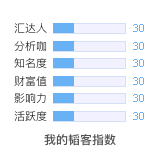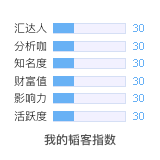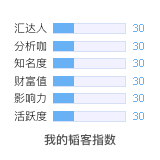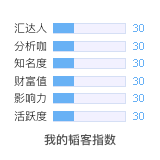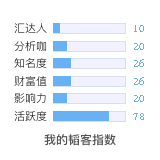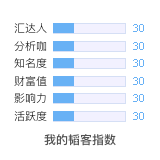巴菲特在04年报中对美国贸易逆差及$的看法:
Foreign Currencies
外汇投资
Berkshire owned about $21.4 billion of foreign exchange contracts at yearend,
spread among 12 currencies. As I mentioned last year, holdings of this kind are
a decided change for us. Before March 2002, neither Berkshire nor I had ever
traded in currencies. But the evidence grows that our trade policies will put
unremitting pressure on the dollar for many years to come – so since 2002 we’ve
heeded that warning in setting our investment course. (As W.C. Fields once said
when asked for a handout: “Sorry, son, all my money’s tied up in currency.”)
截至去年底,Berkshire总计持有214亿美元的外汇部位,投资组合遍布十二种外币,去年我就曾说过,这类的投资对我们来说,也是头一遭,直到2002年以前,Berkshire跟我本人从来就没有买卖过外汇,但越来越多迹象显示,目前我们的贸易政策,将为往后几年的汇率不断施加压力,有鉴于此,自2002年起,我们开始调整投资方向以做为因应,就像老牌喜剧演员W.C.Fields所说的一样,「抱歉小子,我的钱全部套牢在外汇上了。」
Be clear on one point: In no way does our thinking about currencies rest on
doubts about America. We live in an extraordinarily rich country, the product of
a system that values market economics, the rule of law and equality of
opportunity. Our economy is far and away the strongest in the world and will
continue to be. We are lucky to live here.
大家一定要搞清楚一点,外汇上的投资不代表我们在唱衰美国,因为我们生活在一个极其富有的国度,这个系统相当重视市场经济,尊重法制,每个人都有公平的机会,我们无疑是当今世上最强大的经济体,而且以后也是,我们是何等的幸运。
But as I argued in a November 10, 2003 article in Fortune, (available at
berkshirehathaway.com), our country’s trade practices are weighing down the
dollar. The decline in its value has already been substantial, but is
nevertheless likely to continue. Without policy changes, currency markets could
even become disorderly and generate spillover effects, both political and
financial. No one knows whether these problems will materialize. But such a
scenario is a far-from-remote possibility that policymakers should be
considering now. Their bent, however, is to lean toward not-so-benign neglect: A
318-page Congressional study of the consequences of unremitting trade deficits
was published in November 2000 and has been gathering dust ever since. The study
was ordered after the deficit hit a then-alarming $263 billion in 1999; by last
year it had risen to $618 billion.
但就像我在2003年11月10日在财富杂志发表的文章所提到的(大家可在Berkshire的官方网站berkshirehathaway.com上找到),我们国家现今的贸易政策终将拖垮美元,美元价值目前已大幅下滑,且没有任何好转迹象,若政策不改,外汇市场脱序的情况将不断发生,并在政治与金融面上产生连锁效应,虽然没有人保证影响的层面有多广,政治人物却不得不正视此问题的严重性,但政客们目前所采的态度却是刻意的忽视,一项厚达318页的贸易赤字评估报告在2000年11月国会发表时,曾引发渲然大波,当时美国一年的贸易赤字达到2,630亿美元,去年贸易赤字却已达6,180亿美元的历史新高。
Charlie and I, it should be emphasized, believe that true trade – that is, the
exchange of goods and services with other countries – is enormously beneficial
for both us and them. Last year we had $1.15 trillion of such honest-to-God
trade and the more of this, the better. But, as noted, our country also
purchased an additional $618 billion in goods and services from the rest of the
world that was unreciprocated. That is a staggering figure and one that has
important consequences.
当然必须强调的是,查理跟我都相信,真正的贸易,也就是与他国交换货物与服务的行为,对于彼此都有相当大的益处,去年光是这类的贸易总额就达1.15兆美元,但除此之外,我们另外又向外国多采购了6,180亿美元的产品与服务,这笔居高不下的数字将引发严重的后果。
The balancing item to this one-way pseudo-trade — in economics there is always
an offset — is a transfer of wealth from the U.S. to the rest of the world. The
transfer may materialize in the form of IOUs our private or governmental
institutions give to foreigners, or by way of their assuming ownership of our
assets, such as stocks and real estate. In either case, Americans end up owning
a reduced portion of our country while non-Americans own a greater part. This
force-feeding of American wealth to the rest of the world is now proceeding at
the rate of $1.8 billion daily, an increase of 20% since I wrote you last year.
Consequently, other countries and their citizens now own a net of about $3
trillion of the U.S. A decade ago their net ownership was negligible.
单一方向的虚拟交易,在经济学上总有对价,维持均衡的结果就是以本国的财富移转到国外,其型式有可能是由私人企业或政府部门所发出的借据,或者是出让股票或房地产的所有权,不管怎样,此举将造成美国人拥有自家资产的比例逐渐下滑,平均每天以18亿美元的速度流失中,这数字比去年同期又增加了两成,目前外国人累积持有我国资产已达3兆美元,在十年前这项数字还微乎其微。
The mention of trillions numbs most brains. A further source of confusion is
that the current account deficit (the sum of three items, the most important by
far being the trade deficit) and our national budget deficit are often lumped as
“twins.” They are anything but. They have different causes and different
consequences.
上兆元对一般人来说或许是遥不可及的天文数字,更让人容易搞混的是目前的「经常帐赤字」(由三个项目组成,其中最重要的项目就是贸易逆差),这与我国的「预算赤字」,并称为双胞胎,但两者的成因不同,造成的影响也不同。
A budget deficit in no way reduces the portion of the national pie that goes to
Americans. As long as other countries and their citizens have no net ownership
of the U.S., 100% of our country’s output belongs to our citizens under any
budget scenario, even one involving a huge deficit.
预算赤字仅会造成本国内财富的重分配,别的国家与人民不会增加对我们资产的所有权,也就是说就算是赤字飙上天,国内所有的产出所得,仍将归我国民所有。
As a rich “family” awash in goods, Americans will argue through their
legislators as to how government should redistribute the national output – that
is who pays taxes and who receives governmental benefits. If “entitlement”
promises from an earlier day have to be reexamined, “family members” will
angrily debate among themselves as to who feels the pain. Maybe taxes will go
up; maybe promises will be modified; maybe more internal debt will be issued.
But when the fight is finished, all of the family’s huge pie remains available
for its members, however it is divided. No slice must be sent abroad.
当一个国家强盛富粟时,美国人民可透过国会议员来争取如何分配国家产出,也就是谁必须付税而谁可以得到政府的补助,如果开出的支票过于浮滥,家族成员便会激烈地争辩谁将受累,或许会以调高税赋因应,或许开出的承诺会做些调整,也或许会发更多的公债,但一旦纷争结束,家中所有的饼不管怎么分,依旧是由所有成员来分享,绝不会有外人进来分一杯羹。
Large and persisting current account deficits produce an entirely different
result. As time passes, and as claims against us grow, we own less and less of
what we produce. In effect, the rest of the world enjoys an ever-growing royalty
on American output. Here, we are like a family that consistently overspends its
income. As time passes, the family finds that it is working more and more for
the “finance company” and less for itself.
但目前积重难返的经常帐赤字将改写整个游戏规则,随着时间过去,债主将一一上门,将我们收入瓜分殆尽,其结果是世界上其它人从我们身上抽取的税捐一天比一天高,而我们就像是一个入不敷出的家庭,而且慢慢会发现,辛苦的工作所得,将被债主吸得一乾二净。
Should we continue to run current account deficits comparable to those now
prevailing, the net ownership of the U.S. by other countries and their citizens
a decade from now will amount to roughly $11 trillion. And, if foreign investors
were to earn only 5% on that net holding, we would need to send a net of $.55
trillion of goods and services abroad every year merely to service the U.S.
investments then held by foreigners. At that date, a decade out, our GDP would
probably total about $18 trillion (assuming low inflation, which is far from a
sure thing). Therefore, our U.S. “family” would then be delivering 3% of its
annual output to the rest of the world simply as tribute for the overindulgences
of the past. In this case, unlike that involving budget deficits, the sons would
truly pay for the sins of their fathers.
若是我们让经常帐赤字的情况继续恶化下去,未来十年内外国人持有我国资产的数目将爆增到11兆美元,而若以平均5%的投资报酬率来计,我们每年还须额外支付5,500亿美元的劳务与货品给外国人,十年之后,我们的GDP预估不过是18兆美元(假设维持低通膨,虽然这还不是很确定),届时美国家庭,为了过去的挥霍无度,每年都要奉献出3%的全年所得给外国人,在这种状况下,真的就要变成所谓的父债子还了。
This annual royalty paid the world – which would not disappear unless the U.S.
massively underconsumed and began to run consistent and large trade surpluses –
would undoubtedly produce significant political unrest in the U.S. Americans
would still be living very well, indeed better than now because of the growth in
our economy. But they would chafe at the idea of perpetually paying tribute to
their creditors and owners abroad. A country that is now aspiring to an
“Ownership Society” will not find happiness in – and I’ll use hyperbole here for
emphasis – a “Sharecropper’s Society.” But that’s precisely where our trade
policies, supported by Republicans and Democrats alike, are taking us.
每年要支付给外国的年贡,除非是美国人从现在开始缩衣结食,同时持续地增加贸易顺差,否则定将引起国内的政局纷扰,虽然在这种情况下,美国人依旧能够维持不错的生活水平,事实上拜经济成长所赐,过得会比过去还好,但光想到每年定期要向外国朝贡,对于一个强调「所有权社会」的国家来说,可能就会引起国人一肚子气,在这里我必须夸张一点地讲,「佃农经济」,这正是共和党与民主党这些政客,准备带领我们前进的方向。
Many prominent U.S. financial figures, both in and out of government, have
stated that our current-account deficits cannot persist. For instance, the
minutes of the Federal Reserve Open Market Committee of June 29-30, 2004 say:
“The staff noted that outsized external deficits could not be sustained
indefinitely.” But, despite the constant handwringing by luminaries, they offer
no substantive suggestions to tame the burgeoning imbalance.
许多重量级的美国财经学者,不论是当政的或是在野的,都一再重申,目前的经常帐赤字绝非常态,举例来说,美国联邦准备公开市场操作委员会于2004年6月29-30日的会议记录中便提到,幕僚群已注意到我们绝对无法负荷长期大量的外部赤字,尽管一些重量级人物不断大声疾呼,但实际上他们还是无法提出彻底解决贸易赤字的具体方案。
In the article I wrote for Fortune 16 months ago, I warned that “a gently
declining dollar would not provide the answer.” And so far it hasn’t. Yet
policymakers continue to hope for a “soft landing,” meanwhile counseling other
countries to stimulate (read “inflate”) their economies and Americans to save
more. In my view these admonitions miss the mark: There are deep-rooted
structural problems that will cause America to continue to run a huge
current-account deficit unless trade policies either change materially or the
dollar declines by a degree that could prove unsettling to financial markets.
在我16个月以前于财富杂志刊登的一篇文章当中,我就曾警告,持续贬值的美元并不能解决问题,到目前为止,确是如此,然而政府官员却依然希望经济能够软着路,同时敦促本国人省着点花用,其它国家刺激(应该说是膨胀)本国经济,在我看来这些建言都没有切中要点,除非贸易政策大幅改弦更张或是美元大幅贬值到惊天动地的程度,否则根深蒂固的结构性失衡问题仍将持续困扰金融市场的运作。
Proponents of the trade status quo are fond of quoting Adam Smith: “What is
prudence in the conduct of every family can scarce be folly in that of a great
kingdom. If a foreign country can supply us with a commodity cheaper than we
ourselves can make it, better buy it of them with some part of the produce of
our own industry, employed in a way in which we have some advantage.”
赞成维持现状的支持者喜欢引用亚当史密斯的话说,如果每个家庭的做法都正确无误,那么整个国家的方向就错不了,如果外国人能够生产出比我们自己还要便宜的东西,那当然是用我们自家产出较具竞争优势的东西拿来做交换。
I agree. Note, however, that Mr. Smith’s statement refers to trade of product
for product, not of wealth for product as our country is doing to the tune of
$.6 trillion annually. Moreover, I am sure that he would never have suggested
that “prudence” consisted of his “family” selling off part of its farm every day
in order to finance its overconsumption. Yet that is just what the “great
kingdom” called the United States is doing.
我同意这点,但是请注意,史密斯先生的说法,指的是以物易物,而不是拿家产来做交换,尤其是当我们一年要典当6,000亿美元的资产,同时我相信他同样也不赞同家人以变卖资产的方式来弭补过度消费的缺口,而很不幸的,这正是当今最伟大的国家-美利坚合众国正在做的事。
If the U.S. was running a $.6 trillion current-account surplus, commentators
worldwide would violently condemn our policy, viewing it as an extreme form of
“mercantilism” – a long-discredited economic strategy under which countries
fostered exports, discouraged imports, and piled up treasure. I would condemn
such a policy as well. But, in effect if not in intent, the rest of the world is
practicing mercantilism in respect to the U.S., an act made possible by our vast
store of assets and our pristine credit history. Indeed, the world would never
let any other country use a credit card denominated in its own currency to the
insatiable extent we are employing ours. Presently, most foreign investors are
sanguine: they may view us as spending junkies, but they know we are rich
junkies as well.
换个角度来说,如果美国现在享有的是6,000亿美元的贸易顺差的话,其它国家一定会立刻跳出来谴责我们的贸易政策,将之视为重商主义,也就是长久以来,为人所垢病的鼓励出口、压抑进口、囤积财富的经济政策,我对这种做法也期期以为不可,但事实上就算不是有意的,目前世界上其它国家确实正对美国实行重商主义,觊谀我国丰厚的资产以及深厚的家底,确实除了美国以外,世界上再也没有其它国家可以享有几乎无上限的信用额度,截至目前为止,大部份的外国人还是相当乐观,他们认定我们是花钱如流水的败家子,而且是极其富有的败家子。
Our spendthrift behavior won’t, however, be tolerated indefinitely. And though
it’s impossible to forecast just when and how the trade problem will be
resolved, it’s improbable that the resolution will foster an increase in the
value of our currency relative to that of our trading partners.
但我们这种挥金如土的行为,不可能无限制地持续下去,虽然很难预估这样的贸易问题未来将如何收尾,但可以肯定的是,绝对不可能依靠美元对其它货币大幅升值的结局。
We hope the U.S. adopts policies that will quickly and substantially reduce the
current-account deficit. True, a prompt solution would likely cause Berkshire to
record losses on its foreign-exchange contracts. But Berkshire’s resources
remain heavily concentrated in dollar-based assets, and both a strong dollar and
a low-inflation environment are very much in our interest.
我们很希望美国能够提出一套立即解决贸易逆差的方案,虽然,这样将使得Berkshire帐上立即产生大量的外汇交易损失,但由于Berkshire大部份的资产还是摆在以美元为计价的资产之上,强势的美元以及低通膨的环境还是我们的最爱。
If you wish to keep abreast of trade and currency matters, read The Financial
Times. This London-based paper has long been the leading source for daily
international financial news and now has an excellent American edition. Both its
reporting and commentary on trade are first-class.
如果你想要持续追踪贸易与汇率问题,建议你看金融时报,这份伦敦地区发行的报纸长期引领国际金融讯息,同时还发行有美国版,它们在贸易方面的报导与社论都堪称一流。
发表于:2005-09-09 14:27只看该作者
2楼
谢谢英文和准确的翻译
坚持是到达胜利的唯一途径
发表于:2005-09-09 14:38只看该作者
3楼
谢谢,有借鉴作用
韬客社区www.talkfx.co
发表于:2005-09-09 14:47只看该作者
4楼
韬客外汇论坛TALKFOREX.COM
发表于:2005-09-09 14:51只看该作者
5楼
感谢楼主
发表于:2005-09-09 14:52只看该作者
6楼
谢谢!
williamsir
发表于:2005-09-09 15:41只看该作者
8楼
发表于:2005-09-09 15:55只看该作者
9楼
谢谢!
韬客社区www.talkfx.co
发表于:2005-09-09 15:57只看该作者
10楼
发表于:2005-09-09 16:41只看该作者
11楼
Very accurate translation!
赚点钱,找点乐,留下点足印~.^






